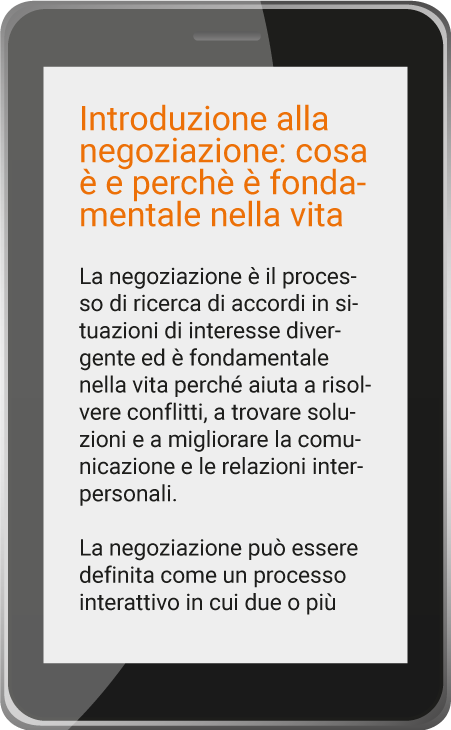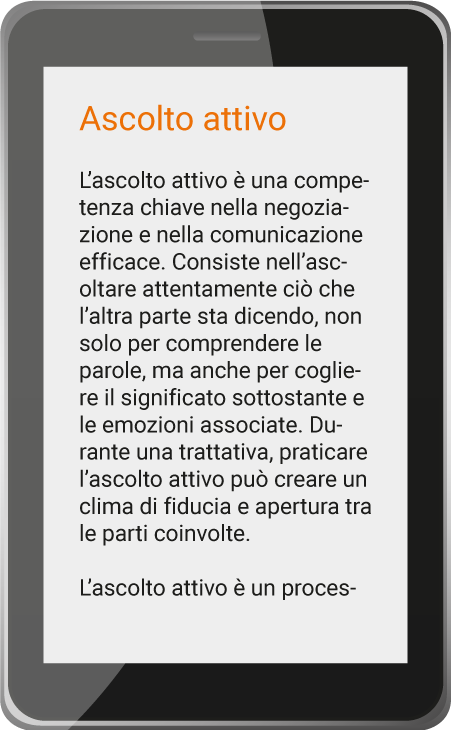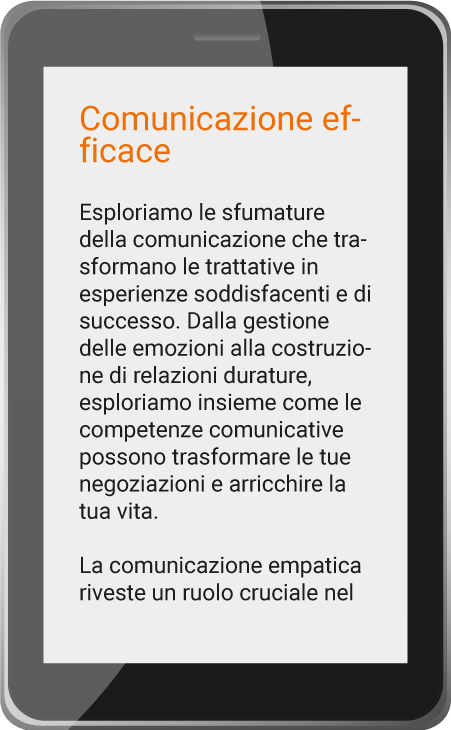Intuition, if cultivated and understood, can become a trusted guide in negotiating decisions. With a deeper understanding of this concept, you will be able to make more informed decisions, trusting your instincts and approaching negotiations with a new perspective, fostering positive outcomes and successful business relationships.
In the maze of negotiations, decisions represent the crucial crossroads that determine the path to success or failure of a deal. It is not just a matter of numbers and facts; there is an underlying element that we often overlook: intuition. It is like an internal radar that guides us through the nuances of negotiations, often offering clearer and more insightful direction than cold data and detailed analysis.
Every decision is an investment, influencing the fate of deals and relationships built.
A wise choice can act as a glue, creating bonds based on mutual trust and satisfaction for both parties involved.
Intuition is not just an abstract feeling but a tangible resource that is based on past experiences, instantaneous perceptions and a dash of acquired wisdom.
It is that inner voice that suggests avenues not yet explored, allowing us to seize opportunities we might otherwise overlook.
In this article, we will explore intuition as an often underestimated ally in negotiations. It is not about ignoring data or strategic plans, but about enriching decision making with a more human and instinctive perspective. Accepting intuition as an integral part of negotiations allows us to make choices that resonate with the heart of the deal, making negotiations not only financially satisfying but also imbued with genuine human connections. So at the next negotiating table, listen to that quiet voice within you; it may be the key to opening unexpected doors to success.
Intuition: a term we often throw into a vague limbo between the mystical and the rational. What is it, exactly? Is it that spark of wisdom that guides our choices when we are in the heart of a negotiation, prompting us to take bold steps based on nothing more than an inner hunch?
Intuition is not magic or chance. It is a form of knowledge gained through past experiences and instantaneous perceptions. It is that chill on the back that tells us to trust or remain on guard, without an immediate logical explanation. It is the result of our brains processing information in ways we often cannot fully understand, but we can certainly perceive.
Intuition manifests itself in various forms: a sudden feeling of safety, a sudden idea that seems to illuminate the whole scenario, or even an uneasy feeling that alerts us to possible danger. It can present itself as a quiet voice in the chaos of negotiations, offering valuable suggestions that escape rational analysis.
Trust in intuition is like sailing the open sea following the stars. When we trust our instincts, we allow our decisions to tap into a deep, intrinsic source of wisdom. In a world of data analysis and detailed plans, intuition adds a human element to negotiations. It connects us to the people we negotiate with on a deeper level, helping us read their needs and respond with a unique sensitivity.
Trusting intuition in negotiations is like listening to a symphony of sublime signals that can guide our decisions toward extraordinary outcomes. It is an art that requires practice and self-confidence, but when we allow ourselves to be guided by the inner voice, we can open doors to possibilities that would otherwise remain hidden. In negotiations, intuition is our most valuable ally, leading us toward agreements that are not only financially successful but create authentic and lasting bonds. So, in your next negotiation meeting, listen to that inner whisper-it could be the key to opening doors to new horizons in the business world.
In the intricate fabric of negotiations, where every move counts, intuition emerges as a valuable and often overlooked ally. It is not just an abstract feeling, but an internal radar that can be a guiding beacon in complex situations. In this context, intuition becomes a light that illuminates the decision-making path, leading to wise and intelligent choices that can make the difference between a mediocre negotiation and a brilliant deal.
Intuition is like a secret map that shows us the hidden paths of negotiations. It is based on experience, observation and even the unspoken nuances of conversations. It is that inkling that prompts us to consider a particular option or to remain alert to certain nonverbal signals. In decision making, intuition acts as a filter that helps us discern opportunities from threats and grasp the essence of a situation beyond pure data.
Examples of situations where intuition leads to effective choices:
- Conflict management: intuition can reveal the root cause of a conflict, allowing the main issue to be addressed rather than just treating the symptoms.
- Recognition of opportunities: in a fast-paced negotiation environment, intuition can help identify latent opportunities, even when they are not explicitly stated.
- Interpersonal negotiations: in personal negotiations, intuition can help read the other person’s emotions, enabling an empathetic and constructive response.
- Strategic decisions: in high-risk situations, intuition can guide to bold strategic decisions that are based on deep perception of changes in the market or competitors’ behaviors.
Ultimately, intuition is the fruit of wisdom gained over time. When we trust it and integrate it into the decision-making process, it becomes a reliable beacon that lights the way in negotiations. It is the secret to reading between the lines, understanding the nuances and arriving at solutions that go beyond the numbers. In negotiations, intuition can be our most trusted ally, leading us toward agreements that not only satisfy both parties but also pave the way for deep and lasting relationships in business.
Past experience plays a key role, shaping our intuition through lessons learned from successes and mistakes. Deep knowledge of the context in which we find ourselves, including cultural and industry details, enhances our ability to read situations.
Emotions can sometimes cloud intuition. Learning to manage our emotional reactions, especially under stress, is essential for making clear intuitive decisions.
The relationship between intuition and rationality is crucial. Intuition can be powerful, but when balanced by critical analysis, it can lead to more sound decisions.
To develop and refine intuition, constant practice is crucial. Reflecting on past experiences, analyzing how insights turned out to be correct or not, can provide valuable lessons.
In addition, active listening, which goes beyond words and also focuses on body language and emotions, amplifies the ability to perceive nuanced details.
Being open to new experiences and different perspectives enriches your decision-making arsenal, introducing new variables and nuances to your intuition.
Mindfulness and meditation can help improve your awareness and connection to your inner intuition, making you more sensitive to the nuances of situations.
Intuition is an art that can be cultivated. Understanding the factors that influence accuracy and adopting practices to develop and refine it can improve your ability to make intuitive decisions that open the door to fruitful and satisfying negotiations. Knowing how to listen and trust your instincts is a valuable skill, one that can guide you to new levels of success in the world of negotiations.
We are often faced with a bifurcation: should we follow our instincts or rely on logical, analytical reasoning? Both have their own appeal, but are indicated in different situations, thus creating a fascinating dilemma in decision making.
Intuitive decisions are quick and effortless; they emerge from within without going through filters of analysis. They are based on feelings, past experiences and immediate perceptions. Intuition is like an internal radar that guides us through the complexities of situations, often leading to choices based on a subtle but deep sense of knowledge.
When is an intuitive decision appropriate?
- Emergency situations: when there is little time to analyze details and data, intuition can offer immediate guidance.
- Emotion-based negotiations: In negotiations involving strong emotional elements, intuition can help perceive and respond to the emotional dynamics at play.
- Past experiences: When we have a similar prior experience from which we can learn, intuition can suggest a path based on those memories.
- Decisions Based on Logical Reasoning: The Detailed Analysis.
Decisions based on logical reasoning involve detailed examination of data, facts and evidence. They require critical analysis, comparison of pros and cons, and evaluation of variables. This approach is meticulous and rational, often used for decisions that require careful and thoughtful evaluation of available options.
When, on the other hand, is a decision based on logical reasoning more appropriate?
- Long-term investments: In financial or investment decisions that will affect the long term, in-depth analysis can help predict the implications over time.
- Complex decisions: In situations where there are many variables or complex decisions that require careful evaluation, logical reasoning can lead to well-considered choices.
- Fact-based negotiations: In negotiations that require a solid foundation of data and factual evidence, an analytical approach can provide a stable basis for decisions.
The choice between intuitive decisions and decisions based on logical reasoning depends on the context and nature of the decision. Often, a balanced combination of both can be the key to comprehensive and effective decision making. Navigating between these two paths offers a full range of decision-making tools, enabling us to approach negotiations with a flexible and shrewd approach, ready to respond to challenges creatively and prudently.
The invitation is to harness intuition consciously. Listen carefully, because that is often where the answers to the most intricate questions reside. In addition to data and analysis, intuition adds a human touch to negotiations, connecting us to the people we deal with on a deeper level.
Making decisions based on intuition does not mean ignoring logical reasoning, but rather integrating the wisdom of instinct into your decision-making strategy. When you rely on intuition with awareness, you open the door to unexpected possibilities and innovative solutions. Whether you are involved in a business negotiation or a personal negotiation, remember that intuition is your trusted ally. It is the secret behind many of the wisest and most enlightening choices in life and business. So, in your next negotiation meeting, let your inner voice guide you. Let intuition be your traveling companion, leading you toward effective and successful decisions.



